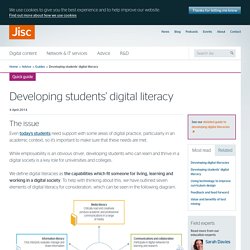

One in three children now has their own tablet computer. 09 October 2014 Twice as many children aged 5-15 are using a tablet to go online Fewer children have TVs, games consoles and radios in their bedroomsNine in ten parents are doing something to help children manage online risks One in three children in the UK now has their own tablet computer, which has nearly doubled in a year, new Ofcom research finds.
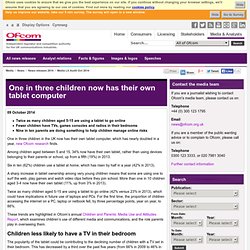
Among children aged between 5 and 15, 34% now have their own tablet, rather than using devices belonging to their parents or school, up from a fifth (19%) in 2013. Six in ten (62%) children use a tablet at home, which has risen by half in a year (42% in 2013). A sharp increase in tablet ownership among very young children means that some are using one to surf the web, play games and watch video clips before they join school. Mobile e-book readers on the rise. 13 October 2014 More people are now using their mobile phones to read e-books, a survey has revealed.
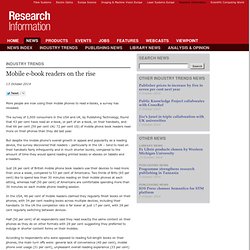
The survey of 3,000 consumers in the USA and UK, by Publishing Technology, found that 43 per cent have read an e-book, or part of an e-book, on their handsets, and that 66 per cent (59 per cent UK/ 72 per cent US) of mobile phone book readers read more on their phones than they did last year. But despite the mobile phone’s overall growth in appeal and popularity as a reading device, the survey discovered that readers – particularly in the UK – tend to read on their handsets fairly infrequently and in much shorter bursts, compared to the amount of time they would spend reading printed books or ebooks on tablets and e-readers. Just 26 per cent of British mobile phone book readers use their devices to read more than once a week, compared to 53 per cent of Americans.
Related internet links Publishing Technology. Inside Steve Jobs schools: swapping books for iPads. The glimmer of screens hypnotises a group of children who swipe their hands from side to side and then up and down, captivated by what’s in front of them.
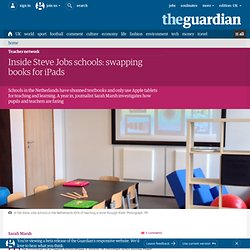
This isn’t a scene from a sci-fi film or a description of the electronics floor in Hamley’s toy shop, it is life inside Netherlands’ new iPad schools.
17 iPad Tips & Tricks For Beginners. 'My iPad has Netflix, Spotify, Twitter – everything': why tablets are killing PCs. Stephen Bernasconi walked into Trafford shopping centre on 25 November intending to buy a laptop for £800 or so.
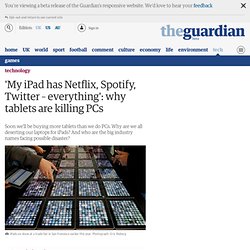
His three-year-old Dell Inspiron had broken down and he wanted something to keep up with gaming. Instead, the 23-year-old walked out of PC World with an iPad Air. "I decided that this would be a more effective purchase as it allows me to do everything I require – Netflix, Spotify, Twitter, good games. It's light and can run loads of apps at once and doesn't slow down. " He'd considered buying a Google Nexus 10 tablet, but having recently switched to an iPhone he decided to stick with Apple. Emma Gilliam, meanwhile, hasn't replaced the Toshiba laptop she used at home since it died in June 2012; she also bought an iPad. She has discussed this with the (unrelated) man opposite her on the train: "His wife – probably around 50 – is also tablet-only. The traditional PC business has a problem: it's in decline.
Tablet sales are booming. This change has happened at amazing speed. 5 of the Top Emerging Technology Trends of 2014. In a recent study, technology research firm Gartner identified a number of top technology trends emerging in 2014, with the potential to have a significant impact on enterprises over the next three years.
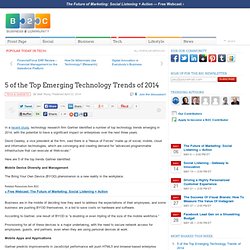
David Cearley, a vice president at the firm, said there is a “Nexus of Forces” made up of social, mobile, cloud and information technologies, which are converging and creating demand for “advanced programmable infrastructure that can execute at Web-scale.” Here are 5 of the top trends Gartner identified: Mobile Device Diversity and Management The Bring Your Own Device (BYOD) phenomenon is a new reality in the workplace.
Related Resources from B2C» Free Webcast: The Future of Marketing: Social Listening + Action. Disability technology: Is the future already here? 13 November 2013Last updated at 21:54 ET By Emma Tracey BBC News, Ouch Technology has long been heralded as a solution to the many difficulties experienced by disabled people.
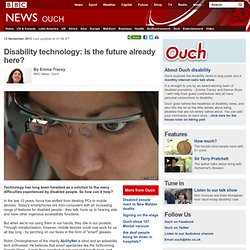
So how can it help? In the last 10 years, focus has shifted from desktop PCs to mobile devices. Today's smartphones are mini-computers with an increasing range of features for disabled people - they talk, hook up to hearing aids and have other ingenious accessibility functions. But when we're not using them in our hands, they idle in our pockets.
Robin Christopherson of the charity AbilityNet is blind and an adisability tech enthusiast. "On my phone I've got an app called talking goggles, which performs real-time object recognition," says Christopherson. Speaking on this month's Ouch talk show, Christopherson lists how these devices could help people with a range of impairments. In other headlines, we often hear of paralysed people who control computers with their minds. Additional reporting by Damon Rose. Does the use of games- based learning and apps have a future in education. Reports and findings - EU Kids Online - Research - Department of Media and Communications. Developing students' digital literacy. The issue Even today’s students need support with some areas of digital practice, particularly in an academic context, so it’s important to make sure that these needs are met.
